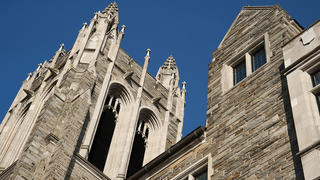Gender Race and Justice Course Focuses on Social Injustice

Editor's note: This article was written prior to University of the Sciences' merger with and into Saint Joseph's University and does not reflect the current, combined institution. References to programs, offices, colleges, employees, etc., may be historical information.
A new course offered in Misher College of Arts and Sciences beginning in the Fall of 2020 focuses on inequalities of race, class, and gender and highlights how these inequalities intersect with our system of justice.
“For example, The United States has the highest per-capita incarceration rate in the world, disproportionately imprisoning poor people of color,” said Michelle Ramirez, PhD, MPH, associate professor of anthropology, who is the instructor for the course, “Gender, Race, and Justice” in the Department of Humanities.
Dr. Ramirez said she hopes that students learn that hierarchies of race and gender are culturally constructed categories that affect all aspects of human life, and because these hierarchies are socially produced, we have the power to change them.
“I hope [this course] raises questions about how the particular systems of power and privilege came into being and who is served by them,” said Dr. Ramirez. “What can be done to change these systems? And what our voices and our votes can do to create a more just and peaceful world.”
Dr. Ramirez said she also hopes that students learn more empathy and compassion for those who are disproportionately burdened by inequalities of race, class, and gender, and for some students, this was something they took away from the course.
I hope [this course] raises questions about how the particular systems of power and privilege came into being and who is served by them
Michelle Ramirez, PhD, MPH
“As a white male who was raised by both their parents in a middle-class family, I can sometimes be naive to all the issues and oppression that people deal with. Minorities have to deal with things that I’ll never have to deal with,” said Dante Serchia HS’21. “My spark to take this class came from the killing of George Floyd, but soon into the course, I realized there are other issues happening in the world also. The most important thing I learned in this class is how society created the social construct of gender. Many behavioral and attitudinal differences between sexes come from culture rather than biology.”
“It is important to be educated on race and ethnicity and to know about the history of racism and prejudice and that white privilege is real,” said Madison Morales “It is so important to learn about gender, sexuality, and the LGBTQ+ community, along with race and ethnicity and the hardships that go along with those topics. This class has taught me a lot about it and has educated me to become an ally with all those communities.”
Dr. Ramirez said that she has been teaching about inequalities of race, class, and gender for years, but Fall 2020 felt different.
“It seemed as though students were more open to confronting our nation’s history of colonial and racial oppression after the turbulent summer of 2020,” said Dr. Ramirez. Many of the students in class had participated in social activism over the summer.
“I decided to change the final assignment from the traditional research paper or book review to an activism piece, in part because activism was in the air and it seemed important to tap into this spirit of change and protest,” she said. “There were songs, poems, and educational posters, it was so inspiring, our students inspire me every day! I felt so hopeful about the future of our country after teaching this course.”
